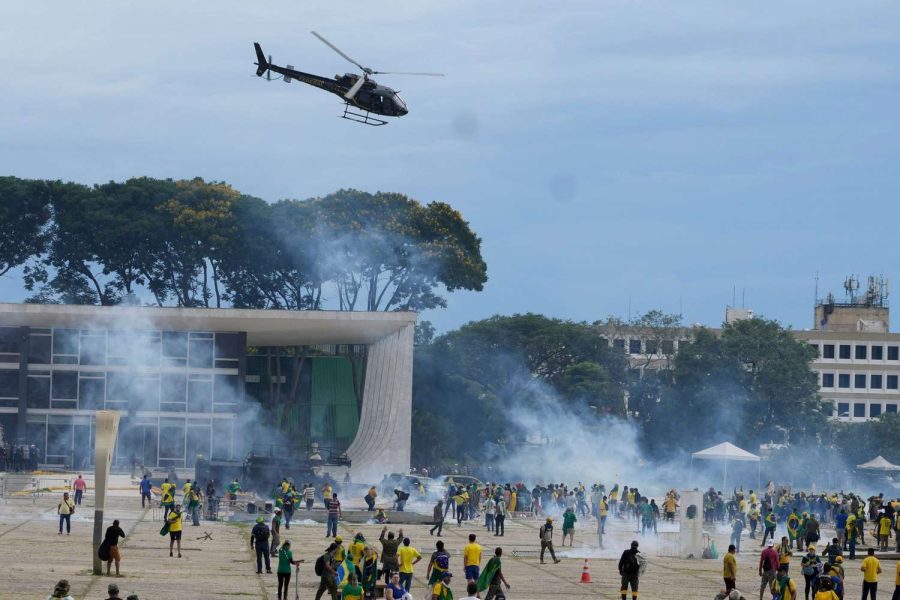Rioters storm Brazilian Congress
Courtesy of Eraldo Peres/AP/SHUTTERSTOCK
Supporters of Bolsonaro storm Brazilian government buildings.
On January 8th, Brazilian supporters of former president Jair Bolsonaro – who recently lost reelection to Luiz Inácio Lula da Silva in the Brazilian general election – stormed the national congress, supreme court, and presidential palace of Brazil. They ransacked government offices and caused extensive damage to all three properties. The raid on the capitol lasted several hours, only ending after police intervention. The riot raises substantial questions surrounding democracy and the democratic process in Brazil.
Brazil’s recent general election in 2022 saw the end of the term for incumbent presidential candidate Jair Bolsonaro and the beginning of the new presidential term for Luiz Inácio Lula da Silva.
Backers of Jair Bolsonaro believe the election was rigged in favor of Luiz Inácio Lula da Silva, denouncing what they claim to be a false election. Bolsonaro himself challenged the election results, claiming some election machines should be “invalidated” for fraud while continuing to fight the results and refusing to concede. Bolsonaro’s supporters showed up in large numbers when 100 full buses showed up to the capital for a planned protest resulting in more than 4000 protesters taking to the streets of Brasília on January 8th.
Lula da Silva III held the office of president two times in the past before resecuring the position in the 2022 elections. Lula da Silva III is seen as the country’s first working-class president. Following his two-term 2003-2010 presidency, Lula was imprisoned in the county’s biggest corruption scandal. After defeating his far-right opponent, Jair Bolsonaro in the recent election, his supporters saw it as a “resurrection” to the position he once held. Lula was a strong supporter of the working people gaining support from the worker party within the county for his policies lifting millions from extreme poverty, expanding access to education and healthcare along with reducing Brazil’s social inequality.
The riot emphasized perceptions of untrustworthiness regarding the electoral process within Brazil. causing extensive damage to not only the capitol grounds but also the electoral reputation of the country. Consequently, Brazil has gained massive media attention about their elections and the candidates running for the presidency. During the riot, police arrested hundreds of rioters, indicting many of them. The government has opened an investigation into the riot,including Brazil’s security failings – which have come under worldwide scrutiny. Many have questioned how the rioters were able to take over the capitol grounds.
The riot eerily shares many similarities with the January 6th riot in the United States. On January 6th, supporters of former president Donald Trump stormed the nation’s capital building to overturn the results of the election after they felt the election was “stolen” from Trump. Rioters believed Democrats used voter fraud and other means in order toto win the election, including breaking the law and interfering with national election infrastructure. Rioters in Brazil shared similar ideas about their election, expressing opinions that it was fraudulent and stolen.
Indeed, Brazil’s debacle seems to be the latest casualty of the decline of democracy and representative government worldwide. Whether it be the United States, Myanmar, or Brazil – authoritarian sentiment is on the rise – and it is accelerating.

